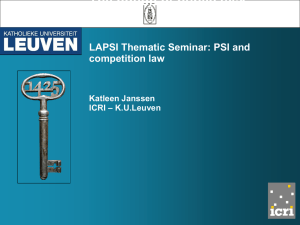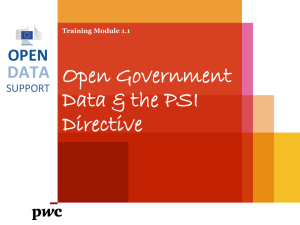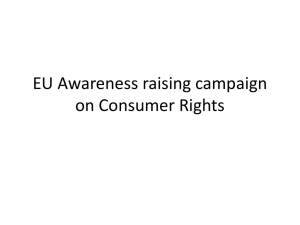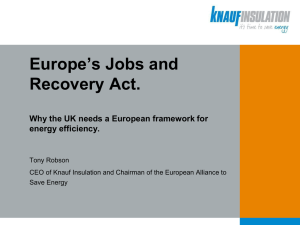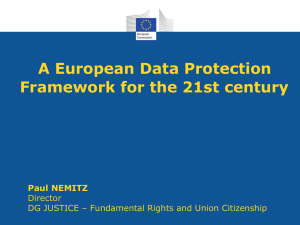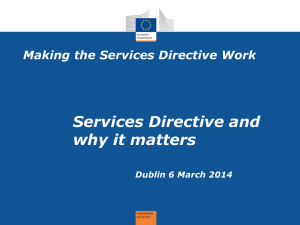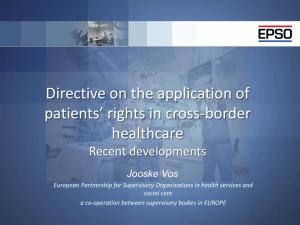(open) government data - Joinup
advertisement
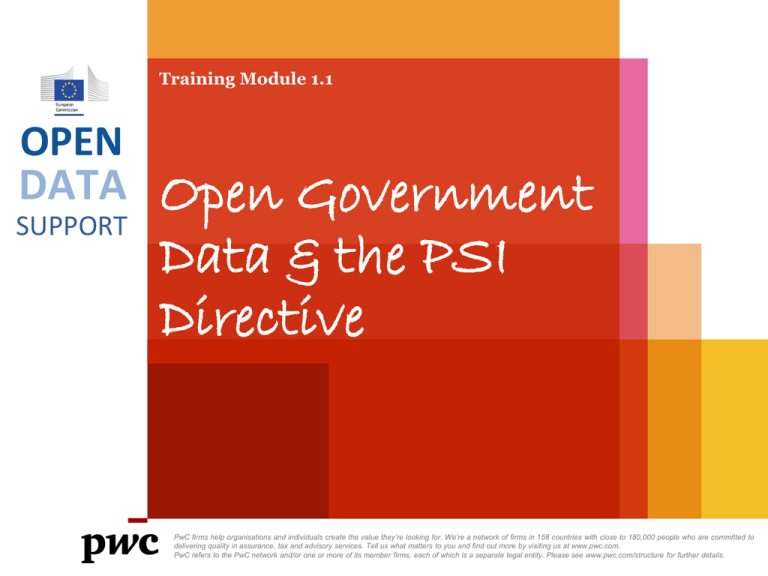
Training Module 1.1 OPEN DATA SUPPORT Open Government Data & the PSI Directive PwC firms help organisations and individuals create the value they’re looking for. We’re a network of firms in 158 countries with close to 180,000 people who are committed to delivering quality in assurance, tax and advisory services. Tell us what matters to you and find out more by visiting us at www.pwc.com. PwC refers to the PwC network and/or one or more of its member firms, each of which is a separate legal entity. Please see www.pwc.com/structure for further details. This presentation has been created by PwC Presentation metadata Open Data Support is funded by the European Commission under SMART 2012/0107 ‘Lot 2: Provision of services for the Publication, Access and Reuse of Open Public Data across the European Union, through existing open data portals’ (Contract No. 30-CE0530965/00-17). © 2014European Commission Authors: Makx Dekkers, Nikolaos Loutas, Michiel De Keyzer and Stijn Goedertier Disclaimers 1. The views expressed in this presentation are purely those of the authors and may not, in any circumstances, be interpreted as stating an official position of the European Commission. The European Commission does not guarantee the accuracy of the information included in this presentation, nor does it accept any responsibility for any use thereof. Reference herein to any specific products, specifications, process, or service by trade name, trademark, manufacturer, or otherwise, does not necessarily constitute or imply its endorsement, recommendation, or favouring by the European Commission. All care has been taken by the author to ensure that s/he has obtained, where necessary, permission to use any parts of manuscripts including illustrations, maps, and graphs, on which intellectual property rights already exist from the titular holder(s) of such rights or from her/his or their legal representative. 2. This presentation has been carefully compiled by PwC, but no representation is made or warranty given (either express or implied) as to the completeness or accuracy of the information it contains. PwC is not liable for the information in this presentation or any decision or consequence based on the use of it. PwC will not be liable for any damages arising from the use of the information contained in this presentation. The information contained in this presentation is of a general nature and is solely for guidance on matters of general interest. This presentation is not a substitute for professional advice on any particular matter. No reader should act on the basis of any matter contained in this publication without considering appropriate professional advice. OPEN DATASUPPORT Slide 2 Learning objectives By the end of this training module you should have an understanding of: • Open Data, Open Government Data, Linked Data and how these concepts relate; • Open Government Data, related policies and initiatives; • The role of the PSI Directive in opening up Government Data. OPEN DATASUPPORT Slide 3 Content This module contains ... • An introduction to Open Data, Open Government Data and Linked Data; • Open Government Data policies; • Case studies with examples of apps and services based on Open Government Data; • The history, objectives and obligations of the PSI Directive. OPEN DATASUPPORT Slide 4 Open Data, Open Government Data & Linked Data What do these terms mean and how do they relate? OPEN DATASUPPORT Slide 5 What is Open Data? “A piece of data or content is open if anyone is free to use, reuse, and redistribute it — subject only, at most, to the requirement to attribute and/or share-alike.” --opendefinition.org In summary, this means the following: • Availability and Access: the data must be available as a whole and at no more than a reasonable reproduction cost, preferably by downloading over the internet. The data must also be available in a convenient and modifiable form. • Reuse and Redistribution: the data must be provided under terms that permit reuse and redistribution including the intermixing with other datasets. • Universal Participation: everyone must be able to use, reuse and redistribute there should be no discrimination against fields of endeavour or against persons or groups. For example, ‘non-commercial’ restrictions that would prevent ‘commercial’ use, or restrictions of use for certain purposes (e.g. only in education), are not allowed. OPEN DATASUPPORT Slide 6 What is Open Government Data? Open government data means: • Data produced or commissioned by government or government controlled entities. • Data which is open as defined in the Open Definition – that is, it can be freely used, reused and redistributed by anyone. • Data that is not sensitive or private. Source:[http://data.gov.uk/data] Source:[http://publicdata.eu/] OPEN DATASUPPORT Slide 7 What is a dataset “A collection of data, published or curated by a single agent, and available for access or download in one or more formats.” --Data Catalogue Vocabulary (DCAT) - W3C For instance: • Credit Institutions Register of the European Banking Authority ; • % of persons employed with ICT user skills; • … OPEN DATASUPPORT Slide 8 Expected benefits of Open Government Data Transparency. Citizens need to know what their government is doing. They need to be able freely to access government data and information and to share that information with other citizens. Sharing and reuse allows analysing and visualising to create more understanding. Releasing social and commercial value. Data is a key resource for social and commercial activities. Government creates or holds a large amount of information. Open government data can help drive the creation of innovative business and services that deliver social and commercial value. Participatory governance. Open Data enables citizens to be much more directly informed and involved in decision-making and facilitation their contribution to the process of governance. Reducing government costs. Open Data enables the sharing of information within governments in machine-readable interoperable formats, hence reducing costs of information exchange and data integration. Governments themselves are the biggest reusers of Open Government Data. OPEN DATASUPPORT Slide 9 What is Linked Data? “Linked Data is about publishing and connecting structured data on the Web, using standard Web technologies to make the connections readable by computers, enabling data from different sources to be connected and queried allowing for better interpretation and analysis.” Tim Berners-Lee outlined four principles of Linked Data: • Use URIs as names for things. • Use HTTP URIs so that people can look up those names. • When someone looks up a URI, provide useful information, using the standards (RDF*, SPARQL). • Include links to other URIs, so that they can discover more things. OPEN DATASUPPORT Slide 10 Open Government Data and Linked Data The five stars of Linked Open Data OPEN DATASUPPORT See also: http://www.slideshare.net/OpenDataSupport /introduction-to-linked-data-23402165 Slide 11 Linked (open) government data – value proposition • Flexible data integration: LOGD facilitates data integration and enables the interconnection of previously disparate government datasets. • Increase in data quality: The increased (re)use of LOGD triggers a growing demand to improve data quality. Through crowd-sourcing and self-service mechanisms, errors are progressively corrected. • New services: The availability of LOGD gives rise to new services offered by the public and/or private sector. • Cost reduction: The reuse of LOGD in e-Government applications leads to considerable cost reductions. See also: ISA Study on Business Models for LOGD https://joinup.ec.europa.eu/community/semic/document/study-businessmodels-linked-open-government-data-bm4logd OPEN DATASUPPORT 12 Group questions http://www.visualpharm.com Some public agencies are sceptical towards Open Government Data, because opening-up data results in a loss of revenue. How would you deal with this in your country? What are, in your opinion, the expected benefits and pitfalls of Open Government Data? http://www.visualpharm.com Can you think of possible value-added applications and services based on Open Government Data? http://www.visualpharm.com Take also the online test here! OPEN DATASUPPORT Slide 13 Open Government Data Policies OPEN DATASUPPORT Slide 14 European Commission Open Data policy Focus on generating value through reuse of a specific type of data – public sector information, sometimes also referred to as government data • Significant potential for reuse in new products and services; • Addressing societal challenges –discover new and innovative solutions; • Achieving efficiency gains inside and between public administrations; • Fostering participation of citizens and increasing transparency of government. Concrete measures: • Legal rules, e.g. revised PSI Directive (Directive 2013/37/EU ) and national legislation, and rules on reuse of the Commission's own data (Commission Decision 2011/833/EU); • Non-legislative measures such as: economic studies, discussion in Member States’ expert group, thematic networks and stakeholder outreach activities; • National/regional/sectoral Open Data Portals. See also: https://ec.europa.eu/digital-agenda/en/open-data-0 OPEN DATASUPPORT Slide 15 UK Open Data White Paper: Unleashing the Potential Main goals: • Building a transparent society • Enhanced access - More open data, engaging developers and users, changing culture in the public sector, regulating data, strengthening usability. • Building trust - Open policy making, privacy impact assessment. • Making smarter use of data - Anonymised data, breaking down barriers. Case studies at: http://data.gov.uk/search/apachesolr_search?filters=ty pe:resource%20tid:11279 OPEN DATASUPPORT Slide 16 Denmark: Good basic data for everyone Public authorities in Denmark register various core information about individuals, businesses, real properties, buildings, addresses, and more. This information, called basic data, is reused throughout the public sector. • Public and businesses are provided a better and more efficient service, when data that has already been recorded is shared across institutions and is included directly in case processing. • Employees in the public sector will be less burdened by repetitive and routine tasks, and this, in turn, will release more resources for increased welfare in e.g. the healthcare and education sectors. • Open and homogenous reuse of basic data also has great value for the private sector, partly because businesses use this data in their internal processes and, partly, because the information contained in public-sector data can be exploited for entirely new products and solutions, in particular digital ones. OPEN DATASUPPORT Slide 17 US Executive Order - Open and Machine Readable Government Information General principles: • Openness strengthens democracy, promotes good services to citizens and contributes to economic growth; fuels entrepreneurship, innovation and scientific discovery and contributes to job creation • Default state for government information resources to be open and machine-readable, managed through life-cycle, promoting interoperability and openness • Release data in such way that it is easy to find, accessible, and usable • Ensure safeguarding individual privacy, confidentiality, and national security OPEN DATASUPPORT Slide 18 Swedish mission for the further development of öppndata.se The Swedish Agency for Innovation Systems (Vinnova) was commissioned in 2012 to develop a technology platform for the dissemination of data that is made available for re-use (öppnadata.se) - a portal for innovation. In order to achieve this objective the platform will provide citizens and businesses with: • A common service directory for published open data sources; • An open directory of the services and applications that have been developed using resources from the above catalogue of services; and • A common development environment for developers. OPEN DATASUPPORT Slide 19 Estonian Open Data Green Book • Green Paper on the disclosure of Public Sector Information in Estonia in a machinereadable format. • The Green Paper is based on the Government's Action Programme 2011 2015 • (In Estonian) OPEN DATASUPPORT Slide 20 France open data strategy The French government agency Etalab, responsible for open government data, published an overview of priorities and activities for the French government concerning open government data. The actions are grouped in the following areas: • Working on opening up strategic data sets; • Facilitating and improving the process of opening up public data in ministries, public institutions and local authorities; • Supporting innovative reuse;; • Evaluation of existing charging practices; • Changes in the administrative and legal framework; • International actions; OPEN DATASUPPORT Slide 21 G8 Charter on Open Data… In the charter, the G8 agreed that open data are an untapped resource with huge potential to encourage the building of stronger, more interconnected societies that better meet the needs of our citizens and allow innovation and prosperity to flourish. The G8 agreed on the following set of principles: • Open Data by Default; The G8 Open Data Charter has been transposed in the Open Data Action Plans of the following EU MSs: • Quality and Quantity; • FR – Open Data Action Plan • Useable by All; • IT – Open Data Action Plan • Releasing Data for Improved Governance; and • UK – G8 Open Data Charter: UK Action Plan 2013 • Releasing Data for Innovation. and the European Commission: OPEN DATASUPPORT • EU – Implementation of the G8 Open Slide 22 Data Charter Group questions Do you have an Open Data policy in your country? If so, what does it foresee? http://www.visualpharm.com http://www.visualpharm.com Some national and local administrations, like the city of New York, are adopting “Open by Default” policies. What is your stand towards this approach? Take also the online test here! OPEN DATASUPPORT Slide 23 Case studies The examples that follow are a small selection of indicative applications built, products offered and services provided on the basis of Open Data. OPEN DATASUPPORT Slide 24 Belgium: Where’s my Villo Crowd-sourced service monitoring Where's My Villo? uses real-time data to track the performance of Brussels' bike-sharing scheme, Villo!, a public-private partnership. The site allows users to report on availability of bikes. The site then presents the empirical evidence that leads to improved services. It uses open government data (location of bike stations) and adds crowd-sourcing for quality monitoring and feedback to the city council. OPEN DATASUPPORT http://blog.okfn.org/2010/10/29/open-data-in-publicprivate-partnerships-how-citizens-can-become-truewatchdogs/ Slide 25 Denmark: Danish Enterprise and Construction Authority Growth and increased revenue from opening up government data The Danish Enterprise and Construction Authority (DECA) opened up its data in 2002. The number of reusers went up by 10,000% leading to a reuse market growth of 1,000% over eight years. The additional tax revenue for the government was estimated to be 4 times the reduction in income from fees. http://dba.erhvervsstyrelsen.dk/ OPEN DATASUPPORT Slide 26 France: Open Food Facts Opening up nutritional food information Open Food Facts France collects data about nutritional products sold all over the world in a collaborative way, for instance by enabling the users to scan a product with an app on their smart phone. All information collected is subsequently made openly and freely available . OPEN DATASUPPORT Slide 27 France: PLF (Projet de loi de finances pour 2013) Data journalism The French news paper Le Monde analyses open government data to collect information for its news articles. The newspaper article illustrated in the figure visualises the main areas of public spending based on the budget proposal from government. http://www.lemonde.fr/politique/article/2012/10 /16/plf-des-avions-au-bouclier-fiscal-la-javades amendements_ 1776093_823448.html OPEN DATASUPPORT Slide 28 UK: FixMyStreet Crowd-sourced problem reporting FixMyStreet is a site to help people report, view, or discuss local problems they have found to their local council by simply locating them on a map. The site was built by mySociety, a project of a registered charity which has grown out of a community of volunteers, and uses maps form the UK Ordnance Service. http://www.fixmystreet.com/ OPEN DATASUPPORT Slide 29 UK: UK Pharmacy User-driven services from government UK Pharmacy helps people in the UK find their nearest pharmacy via their Smartphone. They can search for a pharmacy/chemist using their phone's built-in GPS or via a place name or postcode search. http://www.data.gov.uk/apps/uk-pharmacy OPEN DATASUPPORT Slide 30 Europe: It's Your Parliament Open democracy It’s your parliament gives citizens a unique overview of the votes cast in the European Parliament. Citizens can find and compare voting records of members of the European Parliament (MEPs) and political groups, make your own comments and cast their own "votes". http://www.itsyourparliament.eu/ OPEN DATASUPPORT Slide 31 Europe: Europe's energy Community-driven visualisations Europe’s energy combines data from Eurostat and other agencies to produce graphics which visualise Europe's commitments to reduce energy consumption by consumption by 20% and increase the share of renewables in the energy mix to 20% by 2020. The app puts these targets into context and helps users to compare how progress is being made towards them in different countries. OPEN DATASUPPORT http://energy.publicdata.eu/ee/vis.html Slide 32 Global: OpenCorporates Non-profit business information OpenCorporates is a database of companies. It aims to have a unique identifier in the form a HTTP URI for every company in the world. OpenCorporates has grown from 3 territories and a few million companies to over 30 territories and over 54 million companies, and is working with the open data community to add more each week. OPEN DATASUPPORT http://opencorporates.com/ Slide 33 The Linked Government Data Pilots of ISA http://health.testproject.eu/PPP/ OPEN DATASUPPORT http://maritime.testproject.eu/CISE/ http://cpsv.testproject.eu/CPSV/ Slide 34 The PSI Directive 2013/37/EU of the European Parliament and of the Council of 26 June 2013 amending Directive 2003/98/EC on the reuse of Public Sector Information OPEN DATASUPPORT Slide 35 PSI Directive: history and status • Directive 2003/98/EC on the reuse of Public Sector Information. • By 2008, all Member States had reported implementation of the obligations under the Directive in national legislation. https://ec.europa.eu/digital-agenda/en/implementation-public-sector-information-directive-member-states • Revision of Directive: Proposal COM(2011)877 and public consultation in 2010. • Endorsement and publication of Directive 2013/37/EU of the European Parliament and of the Council of 26 June 2013 amending Directive 2003/98/EC on the reuse of Public Sector Information. • Member States are obliged to implement the new Directive in two years – there will be a gradual adoption of the new obligations. OPEN DATASUPPORT Slide 36 PSI Directive: objectives Revised PSI Directive 2013/37/EU of the European Parliament and of the Council of 26 June 2013 amending Directive 2003/98/EC on the reuse of public sector information. Main objectives: • to stimulate the further development of a European market for services based on Public Sector Information; • to enhance the cross-border use and application of PSI in business processes, including publishing; • to strengthen competition in the internal market; • to address divergence as to reuse rules between Member States. The Directive allows Member States to implement measures going beyond its minimum standards, thus allowing for more extensive reuse. OPEN DATASUPPORT Slide 37 PSI Directive: obligations Public sector bodies have to: Public sector bodies may not: • • Unnecessarily restrict reuse. • Grant exclusive rights, unless necessary, subject to review every 3 years. • • Make information re-usable for commercial or non-commercial purposes under nondiscriminatory conditions. Process requests and provide access within 20 days (or 40 if request is complex); justify negative decision and inform about how to appeal. Charge no more than cost of reproduction, provision and dissemination; publicise charges and indicate calculation basis on request. • Publish licences in digital format. • Facilitate search for information preferably online (e.g. portal). OPEN DATASUPPORT Public sector bodies do not have to: • Make information available that is excluded by virtue of access regimes in the Member States • Adapt formats or provide translations. Note: While libraries, museums and archives are included in the revised Directive, they will be subject to a different regime for reuse and charging. Slide 38 Opening up Public Sector Information How does the revised PSI Directive encourage openness? • Sets minimum rules across the EU for availability of information produced by public sector and government agencies. • Specifies rights for people and organisations that want to reuse the information. • Recommends distribution by electronic means. But: • Does not mandate information to be available free of charge (marginal cost of reproduction, provision and dissemination may be charged). • Allows some public sector organisations to charge in order to cover cost (e.g. special arrangements for cultural heritage organisations). OPEN DATASUPPORT Slide 39 Conclusions • Open Government Data can: - improve government transparency and accountability; - release social and commercial value; - enable participatory governance; and - reduce government costs. • The revised PSI directive requires: - information to be made openly available at (max) marginal costs as a default rule; - information and metadata to be made available in machine-readable and interoperable data formats (wherever possible); and - all legally public documents to be re-usable for commercial or noncommercial purposes. OPEN DATASUPPORT Slide 40 Thank you! ...and now YOUR questions? OPEN DATASUPPORT Slide 41 References Slide 6: Slide 16: • Open Knowledge Foundation. Open Definition. http://opendefinition.org/ • • Open Knowledge Foundation. Open Data Handbook. What is Open Data? http://opendatahandbook.org/en/what-is-open-data/ Slide 17: • Slide 7: • Open Knowledge Foundation. Open Government Data. http://opengovernmentdata.org/ Slide 9: • Tim Berners-Lee, W3C. Linked Data. http://www.w3.org/DesignIssues/LinkedData 5 ★ Open Data. http://5stardata.info/ • EPSIplatform. What is Linked Open Government Data? http://epsiplatform.eu/content/what-linked-open-government-data City of New York “Open by Default” policy. http://nycopendata.pediacities.com/wiki/index.php/Local_Law_11_of_2012 Slide 21 EPSIPlatform. France Outlines Open Data Strategy. http://www.epsiplatform.eu/content/france-outlines-open-data-strategy Slide 22 Slide 11 • US White House. Executive Order -- Making Open and Machine Readable the New Default for Government Information. http://www.whitehouse.gov/the-pressoffice/2013/05/09/executive-order-making-open-and-machine-readable-new-defaultgovernment- Slide 18: Slide 10: • (DK) Basic public data for everyone, http://uk.fm.dk/publications/2012/good-basic-data-foreveryone/ G8 Open Data Charter and Technical Annex. https://www.gov.uk/government/publications/open-data-charter/g8-open-data-charter-andtechnical-annex Study on business models for Linked Open Government Data. https://joinup.ec.europa.eu/node/72473 Slide 14: Slides 34-39: • European Commission. Digital Agenda for Europe, a Europe 2020 Initiative. Open Data. http://ec.europa.eu/digital-agenda/en/public-sector-information-raw-data-new-servicesand-products • EPSIplatform. Quick Guide to the PSI Directive. Fact sheet Version May 2010. http://epsiplatform.eu/sites/default/files/Quick%20Guide%20to%20the%20PSI%20Directiv e_MdV_2.pdf • Open Knowledge Foundation. European Commission launches Open Data Strategy for Europe. http://blog.okfn.org/2011/12/12/european-commission-launches-open-datastrategy-for-europe/ • European Commission. Digital Agenda for Europe. Implementation of the Public Sector Information Directive. https://ec.europa.eu/digital-agenda/en/implementation-publicsector-information-directive-member-states • Europa. Press releases RAPID. Digital Agenda: Commission's Open Data Strategy, Questions & answers. http://europa.eu/rapid/press-release_MEMO-11-891_en.htm?locale=enropeancommission-launches-open-data-strategy-for-europe/ • European Commission. Information Society. Revision of the PSI Directive. http://ec.europa.eu/information_society/policy/psi/revision_directive/index_en.htm • European Commission. Proposal for a Directive of the European Parliament and of the Council amending Directive 2003/98/EC on the reuse of public sector information. COM(2011)877. http://eurlex.europa.eu/LexUriServ/LexUriServ.do?uri=COM:2011:0877:FIN:EN:PDF • EPSIplatform. Public Consultation on PSI Directive Review. http://epsiplatform.eu/content/public-consultation-psi-directive-review • Directive 2013/37/EU of the European Parliament and of the Council of 26 June 2013 amending Directive 2003/98/EC on the reuse of public sector information. http://eurlex.europa.eu/LexUriServ/LexUriServ.do?uri=OJ:L:2013:175:0001:0008:EN:PDF • European Commission. Digital Agenda for Europe. Open Data. https://ec.europa.eu/digitalagenda/en/open-data-o • European Commission COMMISSION DECISION of 12 December 2011 on the reuse of Commission documents (2011/833/EU) http://eur-lex.europa.eu/LexUriServ/LexUriServ.do?uri=OJ:L:2011:330:0039:0042:EN:PDF Slide 15: • (UK) HM Government. Open Data White Paper. Unleashing the Potential. http://data.gov.uk/sites/default/files/Open_data_White_Paper.pdf. • OPEN DATASUPPORT Slide 42 Further reading (1/2) The Danish Dash - A short story unravelling the Danish magic of shaping a System of Key Registers in less than nine months http://thegreenland.eu/2013/07/danis-dash/ UK Government, Market assessment of public sector information https://www.gov.uk/government/uploads/system/uploads/attachme nt_data/file/198905/bis-13-743-market-assessment-of-public-sectorinformation.pdf UK Government, Shakespeare Review - An Independent Review of Public Sector Information https://www.gov.uk/government/uploads/system/uploads/attachme nt_data/file/198905/bis-13-743-market-assessment-of-public-sectorinformation.pdf OPEN DATASUPPORT Slide 43 Further reading (2/2) UK Cabinet Office, G8 Open Data Charter and Technical Annex https://www.gov.uk/government/publications/open-data-charter/g8-opendata-charter-and-technical-annex Semantic Web Company, Open Government Data Weissbuch http://issuu.com/semwebcomp/docs/ogd_weissbuch_2011_web Spending Data Handbook, OpenSpending http://content.openspending.org/resources/handbook/spending-datahandbook.pdf The Open Data Handbook, Open Knowledge Foundation http://opendatahandbook.org/ OPEN DATASUPPORT Slide 44 Related projects and initiatives The Open Data Institute, http://www.theodi.org/ The Open Knowledge Foundation, http://okfn.org/ Engage FP7 ICT project, http://www.engagedata.eu/ The European Public Sector Information Platform, http://epsiplatform.eu/ W3C eGov IG, http://www.w3.org/egov/wiki/Main_Page HOMER project, http://www.homerproject.eu/ World Wide Web Foundation, http://www.webfoundation.org/ The World Bank Open Data, http://data.worldbank.org/ OPEN DATASUPPORT Slide 45 Be part of our team... Find us on Join us on Open Data Support http://www.slideshare.net/OpenDataSupport Open Data Support http://goo.gl/y9ZZI Follow us @OpenDataSupport OPEN DATASUPPORT http://www.opendatasupport.eu Contact us contact@opendatasupport.eu Slide 46
